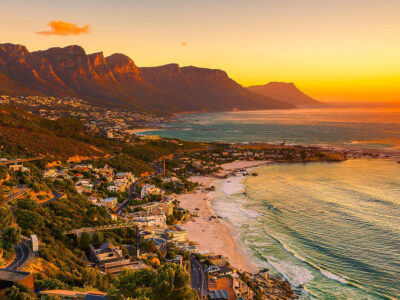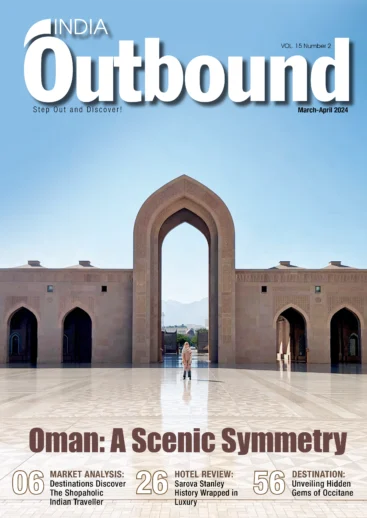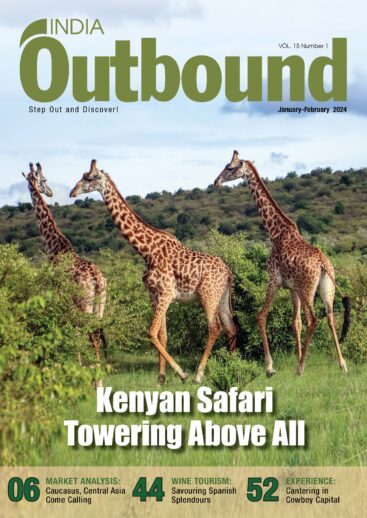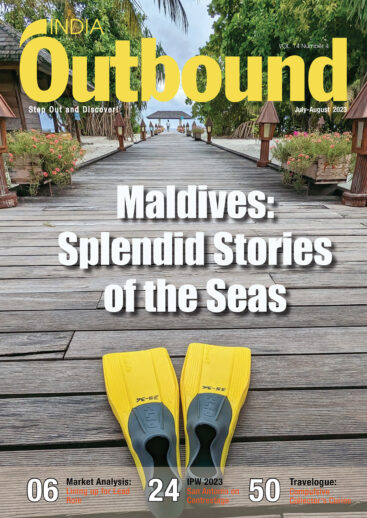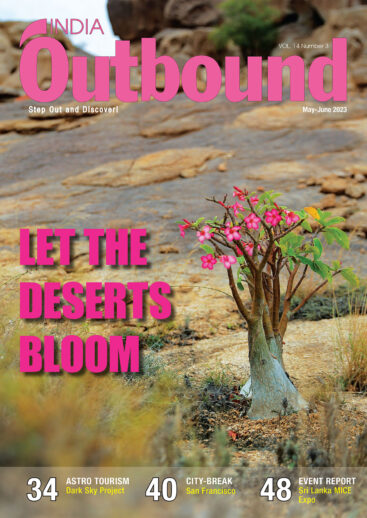
South African Tourism aims to encourage a conscious transformation towards environmentally friendly choices (Photo: India Outbound/Varsha Singh)

Neliswa Nkani (Photo: India Outbound)
As the main theme of World Tourism Day 2023 is green investments, how well is South Africa placed in this?
Sustainability is a product of evolution in the tourism industry. It rightly holds the stage in every discussion, right from our dining rooms to boardrooms. Tourism brands are actively showcasing their new product offerings which are experiential and planet-friendly at the same time. The sector is actively seeking innovative methods to reinvest in destinations and communities.
This approach aims to empower tourism industry in harnessing its potential to create avenues for individuals, fortify resilience, expedite climate action, and greater sustainability for the planet. We, at South African Tourism, are committed to sustainable tourism and responsible travel practices.
Green Investments is a cornerstone of our mission to minimise environmental impact. By implementing sustainable practises, South African Tourism aims to encourage a conscious transformation towards environmentally friendly choices. Such practises seek to fill gaps in the management of tourism’s socioeconomic, cultural, and environmental aspects.
The tourism sector plays a pivotal role in South Africa’s economic landscape, contributing substantially to its GDP and driving socio-economic progress. South African Tourism is leveraging its destination offerings to facilitate the advancement of historically marginalised communities, fostering opportunities for employment and sustained income.
The sector contributes 3.7 pc to South Africa’s GDP, more than agriculture, utilities and construction and is responsible for the employment of roughly 5-8 individuals for every tourist that visits the country.
We have ensured that we increase our marketing efforts towards promoting new regions, also known as “Small Dorpies” to reduce the environmental burden in well-known places and increase job opportunities where it’s needed the most.
This has also allowed travellers to explore some of the purest environments in South Africa such as West Coast of the Cape, Coffee Bay in the Eastern Cape, Sodwana Bay, Robertson and Mc Gregor, offering the most authentic and scenic beauty.
Tourism is one of the world leading employers. With this in mind, we also understand the significance of investing in our people. Every year, through our trade initiatives, South African Tourism encourages more and more SMMEs and women-led businesses to participate and take the centre stage.
In South Africa, the Department of Tourism continues to do commendable work in aiding women who own businesses and empowering those who aspire to own tourism businesses. It actively ensures that women are a part of the tourism value chain and supply chain.
In fact, South Africa is the first country in the world to embrace the principles of Fair Trade in its tourism industry. This certification scheme guarantees fair wages, working conditions, fair sourcing of produce, respect for culture, environment, human rights, and a fair distribution of benefits.
What are the key decisions taken by you to promote sustainable tourism?
The pandemic provided everyone with an opportunity to slow down, reflect on and restructure their practices. It has taught us the importance of taking care of ourselves, our communities, and the planet. It has underscored the importance of our planet and our collective responsibility to look after it with utmost care, fostering harmonious co-existence.
To businesses, it has allowed the time and freedom to bring in innovations, and disruptions and adopt sustainable alternatives. In context to the travel and tourism industry, this has led to a shift towards eco-tourism and responsible travel, where travellers are encouraged to minimize their carbon footprint and support local communities.
South Africa is blessed with beautiful landscapes, enchanting wildlife, and thrilling adventures. Such attractions have allowed us to leverage the abundance of tourism landmarks across provinces and invite travellers for an unforgettable experience from around the world. We are proud to say that travellers are more conscious of the kind of accommodation they choose, where they dine, and how they travel.
At South African Tourism, we have enhanced efforts to make our itineraries, properties, and transport facilities more sustainable. We are also actively promoting our sustainable product offerings and ecotourism experiences, like cycling tours, nature safaris, conservation projects and rural experiences.
In any policy aimed at promoting responsible and sustainable development, ensuring accessibility is a key component. The travel and tourism industry is taking measures to ensure that all people, regardless of age, and physical or cognitive abilities can enjoy amenities in an equitable manner. South Africa prides itself on being a welcoming nation that continuously strives to improve universal access in all its tourism offerings. We work in partnership with various stakeholders to create awareness and encourage the implementation of best practices.
How are you dealing with challenges of talent pool?
Millennials and GenZ, essentially the youth, form a large chunk of the global workforce. Their dynamic energy, creativity, and fresh perspectives present an untapped wealth for several industries. Recognising the diverse landscape of the youth population, along with their challenges and aspirations, it is crucial to develop effective policies, programmes, and initiatives geared that help in unlocking their full potential.
The tourism sector is ripe with opportunities and these young aspirants desire a platform to voice their opinions, seek practical training that complements their qualifications, and yearn for initiatives encouraging leadership.
Addressing the challenges of a talent pool is a critical aspect of our commitment to excellence in the tourism industry. We recognize that a skilled and motivated workforce is the cornerstone of delivering exceptional experiences to the travellers.
We invest in robust training and development programs that equip our team members with the skills and knowledge needed to excel in their roles. This includes both technical skills specific to the tourism industry and soft skills like customer service and cultural awareness.
Furthermore, South African National Department of Tourism has introduced a culinary program aimed at empowering young individuals from underprivileged backgrounds across South Africa. Through this initiative, these students undergo comprehensive training and are subsequently placed in various companies, providing them with invaluable internships.
South African Tourism India in collaboration with South African High Commissioner will be bringing some of these talented individuals to India. This endeavour aims to not only showcase their skills but also to introduce them to the art of Indian cuisine, equipping them with the expertise needed to prepare it proficiently. This will also help enhance our ability to cater to the specific needs of Indian travellers visiting South Africa.
We prioritize creating a work culture that is inclusive, respectful, and conducive to growth. Over the years, I personally have learnt that honest, transparent communication across all hierarchical levels is key to building an efficient and motivated team. Simple steps like communicating frequently, intentionally acknowledging efforts, and acting on feedback makes the team feel valued and motivates a positive working environment, thus optimizing morale.
How serious is climate change for your destination and what measures are you taking to abate its impact?
South African Tourism is acutely aware of the pressing issue of climate change and its potential implications for our destination. The gravity of this challenge is not lost on us, and we are steadfast in our commitment to mitigate its impact on our operations and the communities we serve.
Our destination is particularly vulnerable to the effects of climate change, given its diverse natural beauty and reliance on certain weather-dependent activities. Recognising our responsibility, we are resolute in our commitment to preserving biodiversity. We actively support conservation programs and collaborate with local organizations to safeguard our unique ecosystems.
We advocate for and implement responsible travel behaviour, promoting eco-friendly practices among our guests and partners. We also support and collaborate with accommodations and operators that share our commitment to sustainability. We understand that resilient communities are key to climate adaptation. By actively engaging with local residents, supporting livelihood initiatives, and promoting sustainable economic practices, we aim to build stronger, more climate-resilient communities.











